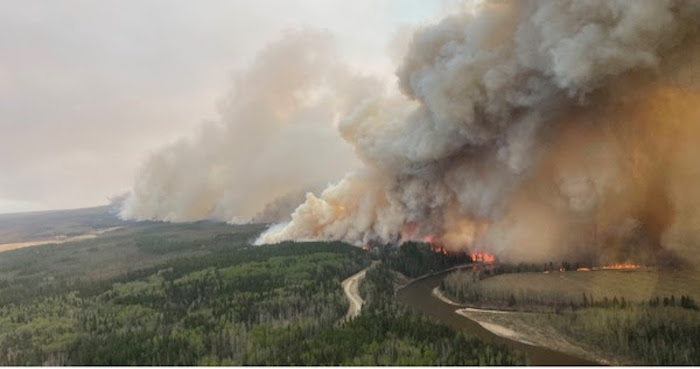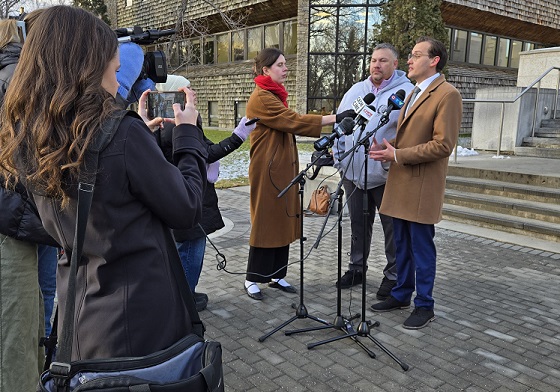Alberta
Alberta declares early start to wildfire season

Province at the ready for 2024 wildfire season
Alberta’s government has declared an early start to the 2024 wildfire season, 10 days earlier than usual, and is encouraging Albertans to proactively prepare.
The impacts of the 2023 season showed Albertans the importance of a collective approach to dealing with disaster. Alberta is experiencing warmer than normal temperatures and below average precipitation in many areas of the province, leading to heightened wildfire risk. To better direct resources to new and existing wildfires, Alberta has declared an early start to the 2024 wildfire season.
Declaring the beginning of the 2024 wildfire season provides additional measures to Alberta Wildfire, including the use of the fire ban and restriction system to help reduce human-caused wildfires in response to hazardous conditions. Furthermore, any Albertan who has burning planned in the Forest Protection Area will require a permit.
“Alberta’s government will face the coming wildfire season head on, and we will do whatever is necessary to help Albertans and their communities stay safe from the impacts of wildfire. I want to encourage Albertans to remain vigilant and recreate responsibly.”
In addition to the early declaration, Forestry and Parks is preparing for additional firefighters. If passed, Budget 2024 will include funding to hire 100 new firefighters, which will result in five additional 20-person crews. These additional firefighters would be a critical addition to the Alberta Wildfire team.
“Wildfire prevention is a responsibility shared by all Albertans. I encourage everyone to follow FireSmart principles, to recreate responsibly while in or near forested areas, to obtain a fire permit prior to burning and to download the Alberta Wildfire app for up-to-date and accurate information.”
As the province has entered the 2024 wildfire season, Alberta’s government encourages all Albertans to become familiar with FireSmart principles and to take an active role in wildfire prevention and mitigation by preparing their properties and communities accordingly.
Albertans are urged to exercise extreme caution in forested areas and to avoid burning under warm, dry and windy conditions. It is also crucial that Albertans remain up to date on fire bans and restrictions in their areas to reduce the risk of human-caused wildfires, which represented more than 60 per cent of wildfires this past season.
Alberta’s government continues working hard to enhance wildfire prevention, preparedness, response and mitigation tactics. Alberta will employ enhanced nighttime wildfire operations, including ground suppression efforts and using night-vision equipped helicopters and nighttime heli-tanking.
Quick facts
- The seven disciplines of the FireSmart program include:
- public education
- interagency cooperation
- cross-training
- emergency planning
- development
- legislation
- vegetation management
Related information
Alberta
New pipeline from Alberta would benefit all Canadians—despite claims from B.C. premier

From the Fraser Institute
The pending Memorandum of Understanding between the Carney government and the Alberta governments will reportedly support a new oil pipeline from Alberta’s oilsands to British Columbia’s tidewater. But B.C. Premier David Eby continues his increasingly strident—and factually challenged—opposition to the whole idea.
Eby’s arguments against a new pipeline are simply illogical and technically incorrect.
First, he argues that any pipeline would pose unmitigated risks to B.C.’s coastal environment, but this is wrong for several reasons. The history of oil transport off of Canada’s coasts is one of incredible safety, whether of Canadian or foreign origin, long predating federal Bill C-48’s tanker ban. New pipelines and additional transport of oil from (and along) B.C. coastal waters is likely very low environmental risk. In the meantime, a regular stream of oil tankers and large fuel-capacity ships have been cruising up and down the B.C. coast between Alaska and U.S. west coast ports for decades with great safety records.
Next, Eby argues that B.C.’s First Nations people oppose any such pipeline and will torpedo energy projects in B.C. But in reality, based on the history of the recently completed Trans Mountain Expansion (TMX) pipeline, First Nations opposition is quite contingent. The TMX project had signed 43 mutual benefit/participation agreements with Indigenous groups along its route by 2018, 33 of which were in B.C. As of March 2023, the project had signed agreements with 81 out of 129 Indigenous community groups along the route worth $657 million, and the project had resulted in more than $4.8 billion in contracts with Indigenous businesses.
Back in 2019, another proposed energy project garnered serious interest among First Nations groups. The First Nations-proposed Eagle Spirit Energy Corridor, aimed to connect Alberta’s oilpatch to a port in Kitimat, B.C. (and ultimately overseas markets) had the buy-in of 35 First Nations groups along the proposed corridor, with equity-sharing agreements floated with 400 others. Energy Spirit, unfortunately, died in regulatory strangulation in the Trudeau government’s revised environmental assessment process, and with the passage of the B.C. tanker ban.
Premier Eby is perfectly free to opine and oppose the very thought of oil pipelines crossing B.C. But the Supreme Court of Canada has already ruled in a case about the TMX pipeline that B.C. does not have the authority to block infrastructure of national importance such as pipelines.
And it’s unreasonable and corrosive to public policy in Canada for leading government figures to adopt positions on important elements of public policy that are simply false, in blatant contradiction to recorded history and fact. Fact—if the energy industry is allowed to move oil reserves to markets other than the United States, this would be in the economic interest of all Canadians including those in B.C.
It must be repeated. Premier Eby’s objections to another Alberta pipeline are rooted in fallacy, not fact, and should be discounted by the federal government as it plans an agreement that would enable a project of national importance.
Alberta
Premier Danielle Smith says attacks on Alberta’s pro-family laws ‘show we’ve succeeded in a lot of ways’

From LifeSiteNews
Recent legislation to dial back ‘woke progressivism’ is intended to protect the rights of parents and children despite opposition from the left.
Alberta Premier Danielle Smith took a shot at “woke progressivism” and detractors of her recent pro-family laws, noting that because wokeness went “too far,” the “dial” has turned in favor of parental rights and “no one” wants their “kid to transition behind their back.”
“We know that things went a little bit too far with woke progressivism on so many fronts and we’re trying to get back to the center, trying to get them back to the middle,” Smith said in a recent video message posted on the ruling United Conservative Party’s (UCP) official X account.
Smith, who has been battling the leftist opposition New Democratic Party (NDP) attacks on her recent pro-family legislation, noted how “we’ve succeeded in a lot of ways.”
“I think we have moved the dial on protecting children and the right of girls and women to participate in sports without having to face born male athletes,” mentioning that the Olympics just announced gender-confused athletes are not allowed to compete in male or female categories.
“I think we’re moving the dial on parental rights to make sure that they know what’s going on with their kids. No one wants their kid to be transitioned behind their back and not know. I mean, it doesn’t matter what your background is, you want to know what’s going on with your child.”
Smith also highlighted how conservatives have “changed the entire energy conversation in the country, we now have we now have more than 70 percent of Canadians saying they believe we should build pipelines, and that we should be an energy superpower.’
As reported by LifeSiteNews, Smith recently said her government will use a rare constitutional tool, the notwithstanding clause, to ensure three bills passed this year – a ban on transgender surgery for minors, stopping men from competing in women’s sports, and protecting kids from extreme aspects of the LGBT agenda – remain law after legal attacks from extremist activists.
Bill 26 was passed in December 2024, amending the Health Act to “prohibit regulated health professionals from performing sex reassignment surgeries on minors.”
Last year, Smith’s government also passed Bill 27, a law banning schools from hiding a child’s pronoun changes at school that will help protect kids from the extreme aspects of the LGBT agenda.
Bill 27 will also empower the education minister to, in effect, stop the spread of extreme forms of pro-LGBT ideology or anything else allowed to be taught in schools via third parties.
Bill 29, which became law last December, bans gender-confused men from competing in women’s sports, the first legislation of its kind in Canada. The law applies to all school boards, universities, and provincial sports organizations.
Alberta’s notwithstanding clause is like all other provinces’ clauses and was a condition Alberta agreed to before it signed onto the nation’s 1982 constitution.
-

 Alberta2 days ago
Alberta2 days agoPremier Smith explains how private clinics will be introduced in Alberta
-

 Alberta2 days ago
Alberta2 days agoAlberta introducing dual practice health care model to increase options and shorten wait times while promising protection for publicly funded services
-

 Business2 days ago
Business2 days agoUS Supreme Court may end ‘emergency’ tariffs, but that won’t stop the President
-

 Aristotle Foundation2 days ago
Aristotle Foundation2 days agoWe’re all “settlers”
-

 Indigenous1 day ago
Indigenous1 day agoIndigenous activist wins landmark court ruling for financial transparency
-

 Alberta1 day ago
Alberta1 day agoRed Deer’s Jason Stephan calls for citizen-led referendum on late-term abortion ban in Alberta
-

 International2 days ago
International2 days ago“The Largest Funder of Al-Shabaab Is the Minnesota Taxpayer”
-

 espionage1 day ago
espionage1 day agoSoros family has been working with State Department for 50 years, WikiLeaks shows

